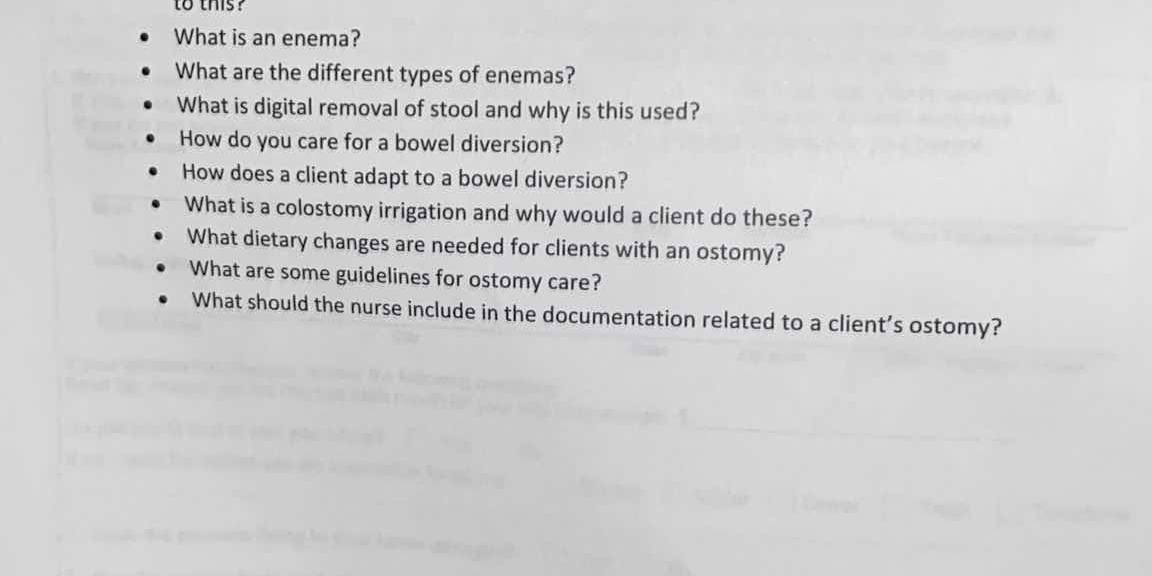What is an enema? What are the different types of enemas? What is digital removal of stool and why is this used? How do you care for a bowel diversion? How does a client adapt to a... What is an enema? What are the different types of enemas? What is digital removal of stool and why is this used? How do you care for a bowel diversion? How does a client adapt to a bowel diversion? What is colostomy irrigation and why would a client do these? What dietary changes are needed for clients with an ostomy? What are some guidelines for ostomy care? What should the nurse include in the documentation related to a client’s ostomy?

Understand the Problem
The question lists several queries related to nursing care and procedures for clients with bowel diversions and ostomies. Each question requires knowledge related to healthcare and patient care practices.
Answer
Enema relieves constipation. Types include cleansing or medicated. Stool removal occurs manually for impaction. Care involves stoma health. Adaptation includes education. Colostomy irrigation aids bowel control. Diet changes manage fiber and gas. Care includes skin care. Documentation notes stoma, output, concerns.
An enema is a procedure involving the insertion of liquid into the rectum to evacuate the bowel, usually to relieve constipation. Types include cleansing enemas, retention enemas, and medicated enemas. Digital removal of stool helps when fecal impaction occurs, manually removing stool from the rectum. Bowel diversion care involves maintaining stoma health and appliance care. Patients adapt through support, education, and gradual lifestyle modifications. Colostomy irrigation is used to control bowel movements post-colostomy. Dietary changes for ostomy patients often involve fiber management and avoiding gas-causing foods. Ostomy care guidelines focus on skin care, pouch maintenance, and education. Documentation should include stoma appearance, output, patient concerns, and any complications.
Answer for screen readers
An enema is a procedure involving the insertion of liquid into the rectum to evacuate the bowel, usually to relieve constipation. Types include cleansing enemas, retention enemas, and medicated enemas. Digital removal of stool helps when fecal impaction occurs, manually removing stool from the rectum. Bowel diversion care involves maintaining stoma health and appliance care. Patients adapt through support, education, and gradual lifestyle modifications. Colostomy irrigation is used to control bowel movements post-colostomy. Dietary changes for ostomy patients often involve fiber management and avoiding gas-causing foods. Ostomy care guidelines focus on skin care, pouch maintenance, and education. Documentation should include stoma appearance, output, patient concerns, and any complications.
More Information
Enemas have been used for ages to manage constipation, enemas can be therapeutic and diagnostic. Patients with ostomies require holistic care to manage the physical and psychological changes involved.
Tips
Common mistakes include not following guidelines for ostomy care, neglecting documentation, and forgetting to educate the patient properly.
Sources
- Enemas: Types, Procedure, Side Effects, and More - WebMD - webmd.com
- Colostomy Irrigation: Treatment, Definition & Causes - my.clevelandclinic.org
- New Ostomy Patient Guide 2024 - ostomy.org
AI-generated content may contain errors. Please verify critical information